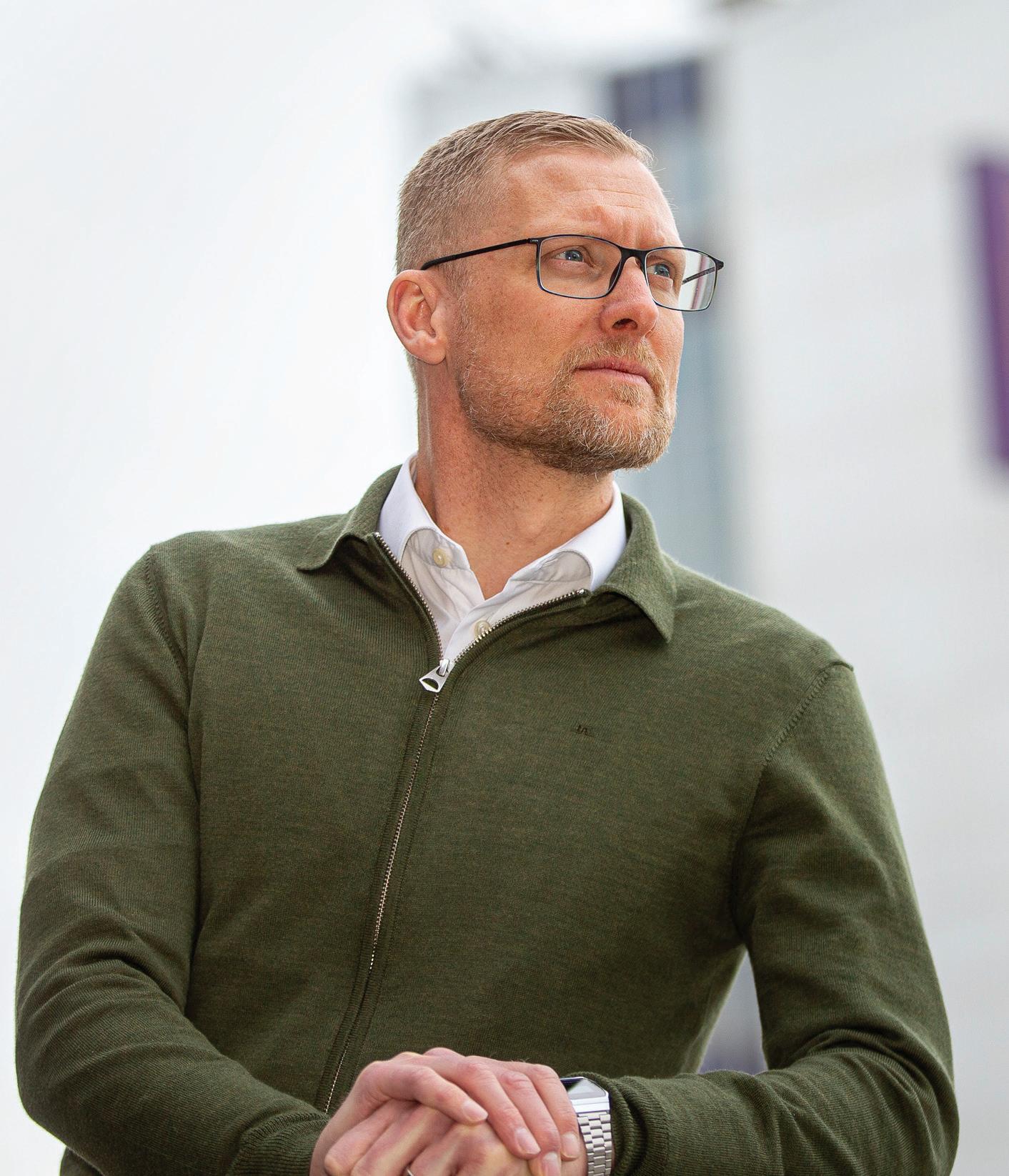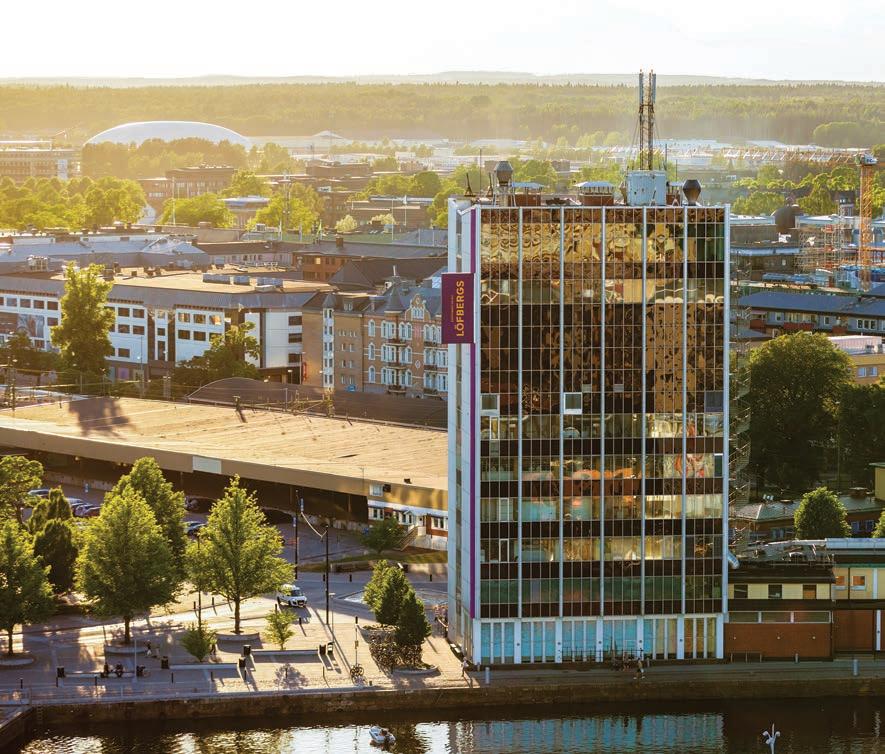
9 minute read
A SWEDISH SUCCESS
from GCR May 2020
by Prime Group
DARE TO DREAM
LÖFBERGS CEO LARS APPELQVIST ON LEADING ONE OF THE NORDIC REGION’S LARGEST FAMILY-OWNED COFFEE ROASTING BUSINESSES, AND THE BEHAVIOURAL TRAITS LIKELY TO EVOLVE AFTER THE WORLD’S VIRAL PANDEMIC ENDS.
It’s the start of the day in Karlstad in the heart of Sweden. Löfbergs’ CEO Lars Appelqvist is making executive decisions for his company hour by hour. He, like so many business leaders facing unprecedented times during the COVID-19 pandemic, is doing his best to secure coffee production and keep morale high.
“My role is two-tiered. One, to keep calm and try to make clear decisions, but two, make people feel safe and strong,” Appelqvist tells Global Coffee Report. “We’ve never seen a situation like this before. We need to adapt, get through this, and come out stronger on the other side.”
Appelqvist has been the leader for his team since 2008, when he was “accidently” appointed Löfbergs’ CEO. He was called on then to lead his team towards growth and achieving sustainable development goals, and he continues to do so in today’s challenging economic climate.
“I’m confident that after this situation is over, it will identify new consumer behaviours, accelerate trends, and produce the next generation of coffee drinkers,” Appelqvist says.
Before the global coronavirus pandemic, Löfbergs had launched a new strategy to help connect people together and help exterminate loneliness, “one fika at a time”.
“Coffee drinking and the tradition of having a fika – the Swedish way of socialising with coffee and cake – is such a big thing for our country, our communities, and our families. It’s what I remember most when I think of my father, grandfather, and visiting my grandmother. It’s very much how I have developed my relationship with coffee,” Appelqvist says.
Löfbergs turned to the Pestle strategic analysis model developed in the United States in the 1960s to study human behaviour within six perspectives: political, economic, sociocultural, technological, legal, and environmental. The company gained insight into what its consumers would value and how it could market its products to adhere to their core principles.
“We learnt a lot from this study. We know that the younger generation is focused on podcasts and movies. They are socially connected all the time, but we also identified that this generation values the spirit of coming together and choosing brands according to their values. They want to know where the product comes from and its impact on the wider community,” Appelqvist says.
As such, Appelqvist is proud that Löfbergs is one of the world’s largest purchasers and importers of organic and Fairtrade-labelled coffee. According to its 2018/2019 Sustainability report, Löfbergs Group increased its share of purchased certified coffee to 71.8 per cent. It contributes SEK52.5 million (about US$5.21 million) in premiums to Fairtrade cooperatives it buys its coffee from and works with more than 180,000 farmers through different cooperation projects.
Appelqvist says Löfbergs is on track to reach its goal of 100 per cent certified coffee across all its brands, in-line with the long-term sustainable perspective the Löfbergs family started 114 years ago.
FAMILY, FIKA, AND FUTURE Brothers Anders, John, and Josef Löfberg founded the Swedish family business, AB Anders Löfbergs, in 1906. In 1911, it started roasting its own coffee in Karlstad, where its headquarters and main roasting operations remain. The company upholds traditional Swedish roasting practices, catering to the country’s preference for medium roast filter blends of Arabica beans, typically from SouthCentral America and East Africa.
Most Swedes consume six to eight cups of filter coffee each day, but Appelqvist says over the past 10 years, there’s been a slow transition to darker roasts and espresso-based coffees.
He adds that the retail sales of whole beans are growing steadily, now more than ever with countries in lockdown and consumers preferencing quality beans in home isolation.
“I expect home coffee consumption to be a behavioural trait that will last long after this crisis is over and lead the next generation of coffee consumers. I predict consumers will continue to invest

Löfbergs, located in Karlstad, Sweden, has an annual production of 27,944 tonnes of coffee.
in home brewing devices and bean-to-cup machines to experience the production of coffee in the comfort of their own homes,” Appelqvist says.
While whole bean sales are on the rise, there is one type of coffee consumption Appelqvist says has failed to take off in the region.
“Capsules are not a big player in the Nordics. Maybe it will be different in 15 or 20 years, but capsules are generally espresso-based and expensive if you want to drink eight cups a day like we do in Sweden. In the United Kingdom and European markets, however, we recognise it has a huge following,” he says. “In the United States, we’re seeing growth and popularity in ready-to-drink coffee and cold brew products, but it’s a few years away from hitting the Nordic market.”
A BALANCING ACT Much like Appelqvist’s CEO appointment, he also describes his employment at Löfbergs as “accidental”. Appelqvist pursued an athletics career from ages 15 to 25, but in 1998, when he realised his professional running days were destitute, he looked for a secure job at Löfbergs, “one of the biggest and most famous brands” in his region. Appelqvist started work in the exports and sales department, followed by a logistics role known as ‘transport planning’, then in production, and the supply chain.
Two weeks before he was appointed company CEO, Appelqvist met with then-CEO Anders Löfberg and observed how tired he looked.
“If that was what being a CEO did to you, I didn’t think I’d want the role, to be honest. I didn’t plan for it. I was very surprised when I was made CEO. I was only 34 years old,” Appelqvist says. “I didn’t believe I could do the job. I wasn’t experienced but [Anders] believed in me, so I had to believe him, and I had to believe in myself.”
Appelqvist says he has the liberty to be quite free in his decision-making and building his 354-strong team, whom he calls his family.
Lars Appelqvist Löfbergs CEO
“I’ve recruited many of them, from salespeople to warehouse workers. People and culture are so important. You are no stronger than your team,” Appelqvist says.
“Coming from athletics, where you are very alone and individual in your training, I thought I could manage the business myself. You soon realise you need to share everything with your people. You need to show you are vulnerable, show you make mistakes, and show you are strong. It’s a balance.”
Now, after 22 years working at Karlstad’s “biggest and best” roaster, Appelqvist remains motivated by the ever-evolving industry.
“You can have a strategic plan for a brand, but you need to have a strategic plan for the different markets you support, the coffee you source, the quality you deliver, and how it’s done in the most sustainable and transparent way,” he says.
“I am most proud of the way we dare to make bold decisions in hard times. We were making acquisitions in 2009 and 2010 when no one else was. We have always dared to go into
new markets, dared to make tough decisions, and dared to make long-term decisions.”
Up until the 1990s, Löfbergs operated mainly in Sweden. Since then, it has started and purchased companies in Norway, Denmark, Finland, and the UK. It has roasting houses in Sweden, Norway, Denmark, and Latvia, and sells its coffee to about 10 markets across Northern Europe, including Estonia, Lithuania, and Ireland, as well as Canada. Probat has been a long-time partner of Löfbergs. It supplies roasting equipment in each of its markets, and helps develop solutions to optimise Löfbergs’ roasting processes.
However, Appelqvist says there’s a fine line in knowing when to forge ahead with a new venture and when to hold back. The UK is one market he identifies as “a slow burn”, while Finland is thriving.
“It’s taken time to find the right way to approach the UK market. There have been ups and downs. Respecting culture takes patience. It’s so easy to be impatient and want to deliver good figures in the short term. We may be in red figures now, but we realise we need to be there in the long term. It’s a market with huge potential and somewhere we want to keep a presence,” Appelqvist says.
“If we can identify a strong underlying trend or interest for coffee when it comes to taste, quality, sustainability, and experience of the brand, then there’s a strong reason to move in. But there’s also markets we have failed. We have stopped projects and stepped back when it’s been difficult to compete, or where there’s been tough pricing scenarios. We have to remember who we are and what we stand for. I’m human. I make mistakes too.”
While other “large roaster players” have their eyes set on the potential of the Chinese market, as a “regional, small player” Löfbergs is focused on markets that are niche and geographically close – for now.
“Large players can be sharp, but we can be sharper. We were the first roaster in the Nordic countries to go for Fairtrade certification. It was a tough decision to make because of price and logistics, but now all the big players have done the same,” Appelqvist says.
Within Sweden, Appelqvist says the region’s main players are divided between large international roasters, local players, and familyowned businesses like Löfbergs.
The company is still fully owned by the Löfberg family, now in its third and fourth generations. Its coffee is sold under Löfbergs and associated coffee brands, including Peter Larsen Kaffe, Melna, Percol, and Green Cup. It also owns Swedish tea brand Kobbs, and organic/vegan snack brand SuperBonobo. Half of its sales are retail based, a third comes from cafés and restaurants under the out-of-home category, and the rest is from external customers that sell or serve coffee under their own brands, such as Ikea and McDonald’s.
The company has an annual turnover of SEK 1.9 billion (about US$1.8 billion) and production of 27,944 tonnes of coffee, equivalent to more than 10 million cups of coffee per day.
In every decision Appelqvist makes, he seeks to uphold Löfbergs’ four values: togetherness, inclusivity, accountability, and entrepreneurship. This means he loves doing business – new and profitable – and is not ashamed to say so if it means securing future generations of producers, and delivering a quality product for consumers.
“We are accountable both within and outside our value chain, which means we are proactive in society and with our consumers. We do things together. We are stronger together. We share things, and we are inclusive,” Appelqvist says.
At present, many of us would like a crystal ball to predict the future, but without it, Appelqvist has a fairly clear idea of where the company is headed.
“By 2030, I think we will be more of a game changer than a disrupter. We will be a global company. It may not mean we will have a roastery or a subsidiary in every country, but we will have a presence from a consumer point of view, meaning we will be connected in some shape or form,” Appelqvist says. “I believe we will be so much more than coffee, but a brand people can connect with. And in times like those we face now, that’s not a bad thing.” GCR











